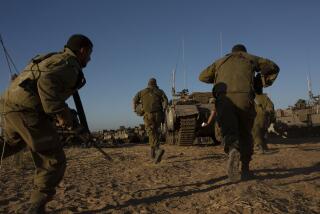A Limited War Is Unfit for the Task in Kosovo
- Share via
A successful war is sometimes more dangerous than a military failure in terms of learning lessons and preparing for future challenges.
For example, Israel’s stunning victory in the 1967 Six-Day War paved the way for the strategic surprise and early setbacks it suffered in the 1973 Yom Kippur War. In the wake of the 1967 conflict, Arab armies were seen as no match for the Israeli military. In addition, an Arab attack was considered unlikely so long as Israel kept the air superiority. Similarly, because the 1991 Gulf War was a brilliant tactical success, its strategic failures have been ignored. The mistakes currently in evidence in Kosovo could be traced directly to this oversight.
First, in the Gulf the U.S. used the strategy of limited war, hoping to achieve total victory. A win on the battlefield was seen as a prelude to the downfall of the Saddam Hussein regime and the “restoration of stability” in the Persian Gulf region. It did not work. America’s indirect approach was unable to achieve its long-term strategic objectives. Saddam is still in power and in all probability is restoring his weapons of mass destruction capability. Moreover, in the Gulf War, air power was used on a vast scale but the liberation of Kuwait was effected only after ground troops were introduced.
In Kosovo, NATO has adopted an even more restrictive policy of relying exclusively on air power. Not surprisingly, this campaign’s shortcomings are even more pronounced. NATO is not only unable to stop the Serb aggression, and thus achieve its tactical objective, but strategically the approach has backfired: Slobodan Milosevic seems more popular than ever.
President Clinton has said that all the options were bad but refusing to act in the face of ethnic cleansing was the worst. However, pretending to solve the problem using means clearly unfit for the task is in the final analysis more cruel than doing nothing. Moreover, it is also dangerous because the limited war doctrine now applied in the Balkans will have far-reaching strategic repercussions.
Second, as in the Gulf War, the U.S. and its allies are again pretending they are unilaterally deciding the terms of the war. No doubt this pretense was made possible because both Saddam and Milosevic have adopted a passive defensive strategy. However, in both operational theaters, mass destruction weapons constitute the hidden element, which exert a profound bearing on the conflict. In the Gulf, U.S. intelligence estimated that if Saddam was pressed to the wall, he would not hesitate to resort to the last resort option: chemical and biological weapons. This was a powerful disincentive to pursue the war into Baghdad. Similarly, in Kosovo there is no question that Serb chemical warfare capacity has a bearing on NATO’s decision to eschew introduction of ground troops. Already, Clinton tried to deter such recourse by promising “a swift and overwhelming response” if Milosevic resorted to chemical or biological warfare.
No doubt the U.S. will claim that the fact that the Serb president has yet to threaten such escalation despite the relentless bombing of his army and even his capital, is in itself testimony to the effectiveness of its deterrence. But as in Iraq, this would only be half the story. Belgrade’s chemical weapons capability already supports the mission of Serb forces in Kosovo by impeding NATO’s ground intervention. Thus, Milosevic has little reason to publicize his chemical option.
The lesson unlearned in the Gulf and is being relearned now is that power is defined by what one is willing to use.
Third, because NATO has adopted a limited war strategy, it is unlikely that the war will end with a clear-cut victory. As much was recognized by Secretary of Defense William S. Cohen when he told the Senate Armed Services Committee that the war is “not going to be quick, or easy or neat.” As in the Gulf, the likely outcome will be that a dangerous dictator will continue in power, potentially threatening stability in a volatile region.
Worse yet, Milosevic is likely to conclude that mass-destruction weapons are the new Praetorian Guard that will guarantee his continuation in power. He is bound to look for surface-to-surface missiles to allow him to threaten European capitals with chemical and biological warheads so as to deter an “Operation Allied Force II.” So will other tyrants with irredentist claims. The bottom line is that America’s limited war approach is encouraging the proliferation of mass destruction weapons in contrast to stated U.S. national security objectives.
The utility of the military option for the world’s democracies is declining. The pattern established in the Gulf War and likely in Kosovo in which dangerous tyrants are left to fight another day is detrimental to world peace. It also suggests the U.S. is equipped with an improper, if not counterproductive, strategy to cope with a world where fanatics are armed with weapons of mass destruction.
More to Read
Sign up for Essential California
The most important California stories and recommendations in your inbox every morning.
You may occasionally receive promotional content from the Los Angeles Times.










